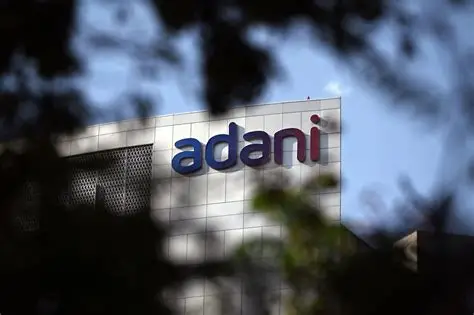I&B Ministry orders takedown of 138 videos, 83 posts on Adani, even targeting platforms not party to the court case.
By Navin Upadhyay
New Delhi, September 17 — The confrontation between the Adani Group and sections of India’s independent media escalated this week, as a series of court orders and government notices deepened concerns about freedom of expression and the growing use of defamation law against journalists.
Veteran journalist Paranjoy Guha Thakurta and four others — Ravi Nair, Abir Dasgupta, Ayaskant Das and Ayush Joshi — have approached a Delhi court challenging a lower court order that restrained them from publishing reports on the Adani Group. Their appeal contests an order passed by Special Civil Judge Anuj Kumar Singh of Rohini Courts, which earlier found prima facie merit in Adani’s claims that the articles were “defamatory and unverified.”
READ: Celebrations and Satire Collide as Modi Marks Milestone Birthday
The September 6 order granted Adani Enterprises Limited (AEL) an ex parte injunction against the five journalists and three websites — pranjoy.in, adaniwatch.org, and adanifiles.com.au. The judge argued that continued publication or circulation of the material risked causing “incalculable damage” to Adani’s reputation, potentially resulting in a “media trial.” The journalists were directed to delete or take down their content within five days, and intermediaries were reminded of their obligations under the IT (Intermediary Guidelines and Digital Media Ethics Code) Rules, 2021, to disable flagged content within 36 hours.
Ina quick follow up, the Union Ministry of Information and Broadcasting (I&B) moved to enforce the injunction. Citing the Rohini court’s order, the ministry issued takedown notices to two media houses and several YouTube channels, demanding removal of 138 videos and 83 Instagram posts that mentioned Adani. Those served included independent outlets such as The Wire and Newslaundry, as well as journalists and commentators like Ravish Kumar, Ajit Anjum, Dhruv Rathee, and Akash Banerjee. Significantly, many of those receiving notices were not parties to the original Adani defamation suit.
The Wire was one of them. It has been asked to remove an Instagram post that referred to allegations levelled by the US Securities and Exchange Commission against the Adani Group, which are matters of record. Experts are questioning the legality of extending the provisions of an ’interim order’ to a party which was not named in the original dispute before the court.
Dear friends and well-wishers, I thank all of you for your support and your solidarity. I would under normal circumstances have been present in the Rohini Courts in north Delhi this afternoon during our appeal against an ex-parte ad-interim order initiated by Adani Enterprises…
— ParanjoyGuhaThakurta (@paranjoygt) September 17, 2025
Meanwhile, the legal dragnet widened. On Tuesday, a court in Gandhinagar’s Adalaj town issued summons to senior journalists Abhisar Sharma and Raju Parulekar, acting on fresh criminal defamation complaints filed by Adani Group. Sharma’s case stems from an August 18 YouTube video alleging large-scale land allotments in Assam to the conglomerate. Parulekar faces charges linked to social media posts since January claiming “land grabs, scams and undue benefits.” Both were ordered to appear before the court on September 20.
Adani Group, in a press release, described the allegations as “baseless and misleading,” stressing that the Assam High Court order cited by the journalists “made no reference to Adani.” The company also denied any link with Mahabal Cement Pvt Ltd, the firm at the centre of that litigation.
Parulekar, however, vowed to fight back. “Truth is the ultimate defence against libel,” he posted on X. “The real defamation shall be of our democracy if the fourth estate is intimidated and impeded on the pretext of libel.”
My Dear Countrymen,
Sub: Without Prejudice 🚨
Cc: @abhisar_sharmaAs a Journalist, it is one’s job to keep the Society informed and awake. The Journalists (not Godi Media), Activists do not raise their voices for themselves but for the betterment of the Society and the Nation.… pic.twitter.com/bph2Dsq3JN
— Raju Parulekar (@rajuparulekar) September 17, 2025
The Adani Group has consistently argued that it is being subjected to “agenda-driven” reporting designed to tarnish its global image, frighten investors, and disrupt operations. Appearing for the company in Delhi, senior advocate Vijay Aggarwal said unchecked dissemination of falsehoods had already caused investor panic and harmed India’s credibility. The court has listed the matter for further hearing on October 9.
For media freedom advocates, the developments point to a troubling pattern: powerful corporate entities using defamation suits to silence investigative reporting. With the I&B ministry now acting as an enforcer of private litigation, critics say the boundaries between corporate interest and state power are increasingly blurred.
As the battle moves from Delhi to Gandhinagar and beyond, the cases are no longer just about Adani’s reputation. They have become a litmus test for the resilience of India’s independent media — and for the country’s commitment to safeguarding dissent in an age of concentrated economic and political power.














